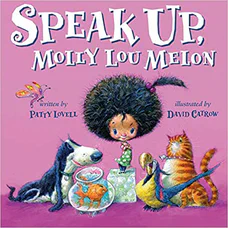Speak Up, Molly Lou Melon
Written by Patty Lovell
Illustrated by David Catrow
40 pages
•
Published 2020 (G.P. Putnam’s Sons Books for Young Readers)

Recommended Age Range: Preschool through 2nd grade.
Publisher's Summary:
Molly Lou Melon’s mother taught her to use her big voice for good–to speak up for what’s right, for those who can’t, and even when it’s hard. So she does. When school starts and a bully begins teasing everyone, including a new student, Molly Lou knows just what to do. From standing up for a friend to admitting when you’ve made a mistake, Molly Lou shows us how speaking up is always the right choice.

Dr. Annie's Takeaways
Recommended for: This book celebrates speaking up for what a child feels is right–whether that be taking accountability, standing up to bullying, or inviting a new kid to play. Molly Lou Melon is “a tiny little girl with a big deep-down heart,” and she will likely inspire children to be brave like she is. This story is a lovely way to talk with children about when it might be difficult for them to speak up and what might happen if they do.
Would a child like it? Many children, perhaps especially girls, will love Molly Lou Melon. She is spunky, brave, and speaks her mind.
Tone: Energizing, bright
Story Quality: Molly Lou Melon is a really great character, and there are a lot of fun details about her that are included in the illustrations (e.g., her inventive spirit and menagerie of animal friends). She is brave, makes mistakes, takes responsibility, cleans up her messes, and stands up for her friends. This book could easily have veered into being pedantic and heavy-handed, but somehow it feels fun and engaging and not-at-all patronizing.
Illustrations: Quirky, cheerful drawings that have a bit of a Dr. Seuss vibe to them.
Representation: Molly Lou Melon is a little girl with light brown skin and a big afro of curly black hair. Her mother is referenced in the text but not pictured. Molly Lou Melon has two friends who are both White–Ronald Durkin and Gertie. Gertie uses forearm crutches that are celebrated in the illustrations and text (e.g., “Ronald stepped forward and so did Gertie, waving her crutch”). The trio adds a fourth friend, Garvin Grape, who is a small, nerdy Black boy with an interest in the laws of gravity. There is a bully who is a White girl named Bettina Bonklehead (she teases Molly Lou and her friend Ronald about being boyfriend and girlfriend and makes fun of Garvin’s interests).
Psychological Practices: This story celebrates Molly Lou Melon’s bravery and integrity when speaking up for what is right, and it shows how positive the consequences of speaking up can be. Molly Lou Melon speaks up when she makes a mistake and gracefully accepts the consequences, she stands up to the bully Bettina when she teases her, she reaches out to the new kid Garvin and invites him to join her friends at recess, and she tells Bettina that “you must never do anything like that again to my friend” after Bettina trips him.
Concerns: Some of Molly Lou Melon’s methods of speaking up are more likely to be effective than others. For example, sometimes when kids tease, it’s more effective to ignore the teasing or brush it off rather than object or react. Molly Lou’s confidence might make this work for her, but sometimes this kind of reaction can make teasing worse. When talking with a child about this kind of self-advocacy, I would encourage a child to practice speaking up in a calm, confident voice. An additional concern: there’s an illustration of Molly Lou getting up in Bettina’s face in an aggressive manner while she tells Bettina to never trip her friend again. I would never encourage a child to react like this, no matter the situation, as it could quickly escalate into an unsafe situation.
